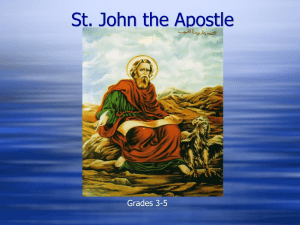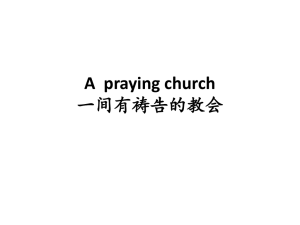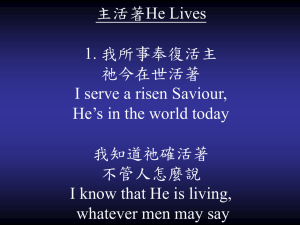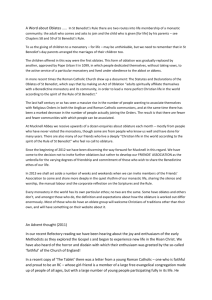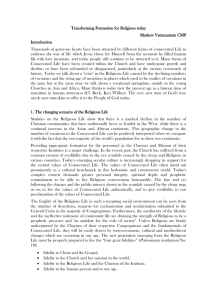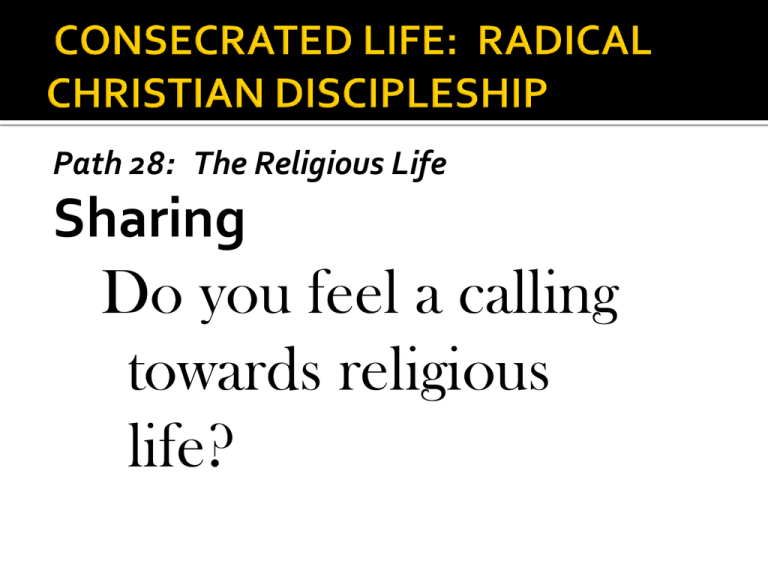
Path 28: The Religious Life
Sharing
Do you feel a calling
towards religious
life?
What sustained the Sister
in her religious life
through all these years?
nurture your relationship with the
Lord through prayer,
seek a Spiritual director, preferably a
religious, who can answer any
questions that arise and help in
deciding whether the call is really
directed to the one concerned.
Vocation
means a call or a strong inclination
to a particular state of life.
gift from God
way of life (single blessedness,
married life, religious
life/priesthood).
As a “call,” it implies the invitation
to respond to God’s love and the
willingness to accept the demands
of loving.
The call to Religious Life or to the
priesthood cannot be but a mark
of God’s special love for the
person interiorly experiencing the
invitation.
1. What is the scriptural passage all
about?
2. Based on the scriptural passage, why
do you think that not all people are
called to married life? Are there other
states of life that people can consider
following?
3. From the way the scripture is
explained, why is Consecrated Life a
radical way of following Jesus Christ?
the unique call to the religious life as it points
out to us that not all are called to this vocation
Single Blessedness; Consecrated Life
entails a total giving of oneself; not all
can live the vows of chastity (celibate
loving) poverty (renouncing of material
foods and living a common life) and
obedience (irrevocably abandoning their
will to God and adhering to His salvific
will; thus, it is a unique and radical way of
living and following Jesus Christ.
1. How do you understand the
Apostolic Exhortation of Pope
John Paul II on the Consecrated
Life?
2. What does the Second Plenary
Council teach about the
Religious Life?
A gift to the Church;
consecrated person gives
his/her total self to the Church
and for the Church with an
undivided heart; not all are
called to this particular
vocation
The religious consecrate
themselves to the
Church and in the Church
as they play an
important role in
evangelization;
affirm the unique
participation of the
religious in the Church;
consecrated life works its
mission in the Church; they
serve the poor,
victims of injustice,
minister to the overseas
workers,
the children in education, and
some other works of the Church
where they can insert
Is lived in community
Share in the same goal, spirituality,
mission and apostolate
Takes evangelical vows of chastity,
poverty and obedience
Live a life of prayer and fraternal
charity
Different types of
ministries
1. Active Religious
2. Contemplative
3. Active-contemplative
a radical commitment to
follow Christ.
It requires maturity…
What special importance or
contribution does religious life give to
the Church?
What is expected of religious who
radically commit themselves to Christ
for the service of the Church?
Why is prayer life important in the life
of a religious?
poverty
-
a turning away from
material wealth
and possessions
and turning
towards heavenly
things.
- A CHOICE OF A CLOSER
AND MORE COMPLETE
RELATIONSHIP WITH THE
MYSTERY OF Christ and
the Church for the good of
all mankind.
THE
OFFER OF THE
FULL DEDICATION OF
THEIR MIND AND
HEART AS A
SACRIFICE OF
THEMSELVES TO God.
Have you witnessed a
perpetual profession?
How did the religious
profess their vows?
What is the importance of
making a public perpetual
profession?
Hosea and his wife Gomer
Gomer failed to appreciate her
blessings, went back to her former
lovers and took her old life of sin
Hosea- a loving husband who yearns
desperately to have a faithful wife
Is a total commitment willed by
God and accepted by the person
who, wishing to belong entirely
and exclusively to God, pledges
him/herself to the practice of the
evangelical counsels as a form of
life which translates God’s calling
into practice.
Prayer life
Community life
Apostolic life
Note: read truths to remember
vocabulary words and moment
of truth
LAITY- LAOS (Greek term) means
“people”...
-refers to baptized Christian people
who are not ordained or have
made religious profession.
-all the faithful except the priest
and those in a religious state
sanctioned by the Church.-sharers in the 3 offices of Christ.
It is rooted in the person of Jesus
Christ.
It is exercised through personal
moral acts which give witness to
our Lord an savior.
Prayer is essential in fostering
Christian lay spirituality and
developing personal relationship
with Jesus.
To a community of familiesrenewing the Christian family life
and forming communities
To Christian presence-inspire the
world with teachings of Christ!
To service and Evangelizationproclaim the word!
To transformation-rebuilding our
society and moving towards greater
reconciliation
the crown of God’s
creation
-created in God’s image
and likeness. As an
image, man has been
called to be the steward of
His creation.
-
Possesses dignity
-capable of knowing,
willing and of freely giving
himself to others.
CFC, 334
Truths of our being above all
other creatures:
1. Gifted with intelligence
2. Capacity to love
3. Have freedom to choose
what is good.
4. Unique ,yet fundamentally
equal
5. A social beings
6. Historical beings
WHO WE ARE?
-Created
by God
-Redeemed by
Christ
-Sanctified by the
Holy spirit
SPIRITUALITY- a way of life which
aids Christians to live a life of
grace according to the spirit
rather than the flesh.
The Youth- need to develop their
personal relationship with Jesus Christ
since they are going to proclaim nothing
else but Jesus, the Way, the Truth and the
Life.
Constant prayer
Frequent reception of the
sacraments
Daily living of the Gospel
values
Participating full at the Mass
Reading the Bible
Pope Paul II called the Youth in His visit
during 10th world Youth Day, to be
responsible pillars of the Church, to
spread the teaching of Christ
To be Jesus’ apostles
Called to a special mission of
evangelization by being communicators
of faith, hope and love
True or False
1. The family is also the place
where religious vocations are
fostered, so that Catholic
marriages have the privilege of
providing the Church with priest
and nuns, as well as with future
holy mothers and fathers, or
dedicated singles.
2.Even without prayer life, the
religious will exist.
Radical Following means
total change of lifestyle,
views, and philosophies in
order to follow his own will
and desire.
4. Perpetual profession
involves contract by which
the religious binds
himself/herself to the
Congregation and actively
participates in its life and
mission.
3.
The religious must have
undergone the
necessary preparations
and formations that will
help them understand
more fully the life that
they are to live for ever
and become more
Christ-like.
5.
1. It is an institutionalized type
of life by which people of the
same sex live in common and
observes the Evangelical
counsels.
2.Religious who give emphasis
to the spiritual and corporal
works of mercy or an
apostolate of service.
3. Religious, who also called
cloistered nuns, center their
activities on prayer and
adoration of the Blessed
Sacrament in their
respective convents or
monasteries.
4. It is a choice of a closer and
more complete relationship
with the mystery of Christ
and the Church for the good
of all mankind.
5. It refers to all baptized
Christian who are not
ordained or have made
religious profession.
6. It is our participation in
proclaiming the Kingdom of
God.
7-9 Based from CFC 334,
identify at least 3 truths of
our being above all the other
creatures.
10-12 what are the
three truths of our
faith that tell us who
we are.
13-15 In what specific
way can you share in
the mission of the son
and the Holy Spirit?






